Papers by Gabriele Jacobs

Technological Forecasting and Social Change, Sep 1, 2020
This article provides empirical research about the perspectives of citizens of Rotterdam, the Net... more This article provides empirical research about the perspectives of citizens of Rotterdam, the Netherlands, on the emergent phenomenon of 'smart urban safety', which advocates advanced uses of digital technologies and data for urban safety management, and is gaining currency in thinking about urban futures. While smart cities affect many dimensions of city management, applications to safety management belong to the most controversial, revealing important tensions between disparate perspectives on technology and society in the context of urban living environments. Despite their influence, the concepts of smart cities and smart urban safety are largely unknown to the public. To gain insights into citizens' perspectives, this study uses smart urban safety vignettes to which participants are invited to respond. Using discourse analytical techniques, their interpretations of safety in the smart city are described, which center on functional designs, express lacking influence over technological developments, and reflect on benefits and risks and on their civic roles vis-à-vis technologically mediated urban safety management. Our article concludes by arguing how these findings complement, but also show limitations to traditional technology acceptance models that are as of yet dominant in research of smart urban safety specifically, and smart cities more generally.
Journal of Business Ethics, Sep 8, 2016
Behavioural ethics Á Change management Á Change recipients Á Change resistance Á Deontic justice ... more Behavioural ethics Á Change management Á Change recipients Á Change resistance Á Deontic justice Á Organizational change Á Policing ''I can only answer the question 'What am I to do?' if I can answer the prior question 'Of what story or stories do I find myself a part?' Alasdair MacIntyre (1981) After Virtue, p. 201''.
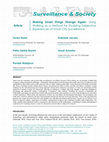
Surveillance & Society
Smart cities are commonly seen as places that are defined by surveillance because of their relian... more Smart cities are commonly seen as places that are defined by surveillance because of their reliance on vast amounts of digital data to improve urban management challenges. Although the infrastructures and technologies that enable smart city surveillance pervade multitudinous urban spaces and everyday practices, they are often “hiding in plain sight,” going unnoticed in the bustle of everyday life. Hence, fostering research settings where citizens can productively reflect on their everyday surveillance constitutes a major challenge for the interrelated projects of doing empirical research about subjective experiences of smart city surveillance and the inclusion of citizens in smart city discussions. Drawing on walking as a method, this study attempts to meet this challenge by developing and empirically testing a methodology of purposive “data walking.” Situating the research in Rotterdam, the Netherlands, participants are instructed to identify data points for public safety purposes ...

Technological Forecasting and Social Change, 2020
This article provides empirical research about the perspectives of citizens of Rotterdam, the Net... more This article provides empirical research about the perspectives of citizens of Rotterdam, the Netherlands, on the emergent phenomenon of 'smart urban safety', which advocates advanced uses of digital technologies and data for urban safety management, and is gaining currency in thinking about urban futures. While smart cities affect many dimensions of city management, applications to safety management belong to the most controversial, revealing important tensions between disparate perspectives on technology and society in the context of urban living environments. Despite their influence, the concepts of smart cities and smart urban safety are largely unknown to the public. To gain insights into citizens' perspectives, this study uses smart urban safety vignettes to which participants are invited to respond. Using discourse analytical techniques, their interpretations of safety in the smart city are described, which center on functional designs, express lacking influence over technological developments, and reflect on benefits and risks and on their civic roles vis-à-vis technologically mediated urban safety management. Our article concludes by arguing how these findings complement, but also show limitations to traditional technology acceptance models that are as of yet dominant in research of smart urban safety specifically, and smart cities more generally.
Journal of Business Ethics, 2016
Behavioural ethics Á Change management Á Change recipients Á Change resistance Á Deontic justice ... more Behavioural ethics Á Change management Á Change recipients Á Change resistance Á Deontic justice Á Organizational change Á Policing ''I can only answer the question 'What am I to do?' if I can answer the prior question 'Of what story or stories do I find myself a part?' Alasdair MacIntyre (1981) After Virtue, p. 201''.
Public Administration Review
Tensions between police organizations and (community) stakeholders have taken center stage in rec... more Tensions between police organizations and (community) stakeholders have taken center stage in recent years, with an escalation in protests and divisive rhetoric observed in many countries. Using attribution theory, this study examines how police officers interpret negative stakeholder feedback and how these interpretations shape their behavioral responses. Qualitative analysis based on 148 interviews with European police officers shows that officers make six different attributions about the causes of stakeholder critique, and that these have direct implications for their behavioral responses. In particular, these different attribution patterns are found to play a critical and hitherto unrecognized role in shaping police‐stakeholder relations and organizational learning among police forces.This article is protected by copyright. All rights reserved.
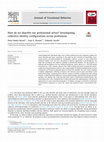
Journal of Vocational Behavior, Aug 1, 2018
understanding as subjective collective framings, which serve as a basis for decisions about work ... more understanding as subjective collective framings, which serve as a basis for decisions about work and careers. This investigation led us to a content-based view of professional identities that extends current theoretical perspectives. We further investigate how collective professional self-understandings may differ across professions and potentially national contexts. A good grasp of the internal makeup of professions is vital to understand career experiences and career decision making processes (Gati & Nathan, 1986). Belonging, for instance, to a stigmatized group within the own profession (e.g., LGBT ministers in the Presbyterian church; Creed, DeJordy, & Lok, 2010) or a group seen as "atypical" (e.g., women entrepreneurs in Bangladesh; Mair, Marti, & Ventresca, 2012) can lead to frictions with members of one's own professional group as well as to internal struggles about how to be part of a profession, when fundamental aspects of the self are not in keeping with the prototype. Such struggles are the result of misfits between individuals' self-constructions and the construction of the collective one belongs to, which can have severe consequences for individuals' wellbeing and career success (Ford, 2012; Vogel & Feldman, 2009). Pinpointing misfits and resolving such struggles are at the heart of many career counseling interventions (e.g., LaPointe, 2010; Perdrix, Stauffer, Masdonati, Massoudi, & Rossier, 2012), often with the purpose of finding a better match between individuals' vocational values and expectations and the occupation and/or environment they work in. Our objective in this paper is to offer a deeper understanding of professional identities as a basis for subjective sense-making of professional groups about their own collective. Such knowledge can help career counselors in identifying content-based (mis)fits and thus improve guidance in vocational decisions such as transitions into other professions or specialties and/or the internal resolution of vocational misfits.
European Law Enforcement Research Bulletin, Jun 1, 2012
We provide an overview of the EU‐funded project COMPOSITE (Comparative Police Studies in the EU).... more We provide an overview of the EU‐funded project COMPOSITE (Comparative Police Studies in the EU). COMPOSITE (www.composite‐project.eu) started in August 2010 and will run until August 2014. Fifteen partners across ten European countries study in this period organisational change in European police forces. In this report we present next to the framework and the main components of COMPOSITE results of the first year of research.
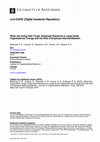
Journal of Organizational Behavior, Aug 24, 2020
Large-scale, long-term change initiatives take time to unfold, which can be a source of uncertain... more Large-scale, long-term change initiatives take time to unfold, which can be a source of uncertainty and strain. Investigating the initial 19 months of a large-scale change, we argue that during these stages, employees' change-related beliefs become more negative over time, which negatively affects their work engagement and, ultimately, increases their turnover intentions. Furthermore, we investigate the impact of a trait, Machiavellianism, on change reactions and propose that employees high in Machiavellianism react more negatively during change processes as they are especially susceptible to uncertainty and stress. We test our (cross-level) moderated mediation model in a three-wave longitudinal study among employees undergoing a large-scale change (T1: n = 1,602; T2: n = 1,113; T3: n = 759). We find that employees' beliefs about the impact and value of the change are indeed negatively related to change duration and that decreases in these perceptions come with a decline in engagement and increases in turnover intentions. Moreover, employees high in Machiavellianism react more strongly to a deterioration in change-related beliefs, showing stronger reductions in engagement and stronger increases in turnover intentions than employees low in Machiavellianism. Our study offers explanations for the negative effects of large-scale changes including an explanatory factor for disparate employee reactions to change over time.
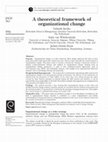
Journal of Organizational Change Management, Aug 23, 2013
Purpose-Organizational change is a risky endeavour. Most change initiatives fall short on their g... more Purpose-Organizational change is a risky endeavour. Most change initiatives fall short on their goals and produce high opportunity and process costs, which at times outweigh the content benefits of organizational change. This paper seeks to develop a framework, offering a theoretical toolbox to analyze context-dependent barriers and enablers of organizational change. Starting from an organizational identity perspective, it aims to link contingency-based approaches, such as environmental scan, SWOT and stakeholder analysis, with insights from organizational behaviour research, such as knowledge sharing and leadership. Design/methodology/approach-The framework is informed by long-lasting field research into organizational change in an international policing environment. The theories in the framework are selected from the perspective of field validity in two ways; they were chosen because the topics covered by these theories emerged as relevant during the field research and therefore it can be expected they have applicability to the field. The authors' insights and suggestions are summarised in 13 propositions throughout the text. Findings-The analysis provides a clear warning that organizational change is more risky and multifaceted than change initiators typically assume. It is stressed that the external environment and the internal dynamics of organizations co-determine the meaning of managerial practices. This implies that cure-all recipes to organizational change are bound to fail. Originality/value-This paper makes an ambitious attempt to cross disciplinary boundaries in the field of organizational change research to contribute to a more comprehensive and holistic understanding of change processes by integrating perspectives that focus on the internal context and the external environment of organizations.
Gruppe. Interaktion. Organisation. Zeitschrift Für Angewandte Organisationspsychologie (gio), Sep 1, 2007
Organisationen im öffentlichen Bereich, wie etwa die deutsche Polizei, unterliegen einem starken ... more Organisationen im öffentlichen Bereich, wie etwa die deutsche Polizei, unterliegen einem starken Veränderungsdruck, um neuen Herausforderungen gerecht zu werden. Anhand von qualitativen Interviews mit angehenden Topmanagern innerhalb der Polizei diskutieren wir die häufig unterschätzte Komplexität von Veränderungsprojekten. Veränderungspläne werden nicht eins zu eins von den Mitarbeitern in die Wirklichkeit umgesetzt, sondern durchlaufen verschiedene Sinnzuschreibungen, die durch bestehende Denk-und Handlungsmuster der Organisationsmitglieder beeinflusst sind. Die aus diesen Mikroprozessen entstehende begrenzte Planbarkeit von Veränderungsprojekten fordert flexiblere und reflektiertere Verfahrensschritte als Masterpläne typischerweise vorsehen.
Proceedings - Academy of Management, Aug 1, 2017
In large-scale change initiatives, uncertainty and strain on employees tend to accumulate over ti... more In large-scale change initiatives, uncertainty and strain on employees tend to accumulate over time. Yet, changes in employees’ reactions during this process and the role of inter-individual differ...
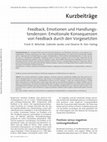
Zeitschrift Fur Arbeits-und Organisationspsychologie, Jul 1, 2008
Zusammenfassung. Die vorliegende Studie untersucht emotionale Reaktionen von Mitarbeitern auf pos... more Zusammenfassung. Die vorliegende Studie untersucht emotionale Reaktionen von Mitarbeitern auf positives versus negatives Leistungsfeedback von ihrem Vorgesetzten sowie daraus resultierende Handlungstendenzen. Der Fokus liegt auf Extra-Rollen-Verhalten (positiv: Organizational Citizenship Behaviors; negativ: Kontraproduktives Arbeitsverhalten, Kündigungsabsicht). Es wurde eine Studie unter 101 Arbeitnehmern durchgeführt. Teilnehmern wurde ein Szenario vorgelegt, in dem sie von ihrem Vorgesetzten für ihre Arbeitsleistung gelobt oder getadelt wurden. Die Ergebnisse zeigen, dass Feedback Emotionen beim Empfänger hervorruft, die die Beziehung zwischen Feedback und Extra-Rollen-Verhalten mediieren. Positives Leistungsfeedback durch den Vorgesetzten führt zu positiven Emotionen, die zu positivem Extra-Rollen-Verhalten ermutigen. Negatives Leistungsfeedback führt zu negativen Emotionen, die negatives Extra-Rollen-Verhalten stimulieren.
European Law Enforcement Research Bulletin, Jul 1, 2017
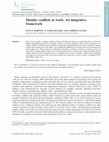
Journal of Organizational Behavior, Aug 6, 2013
This review examines workplace identity conflicts, offering three primary contributions. First, i... more This review examines workplace identity conflicts, offering three primary contributions. First, it reconciles hitherto fragmented perspectives on identity conflicts to offer an integrative and cross-level perspective on identity conflicts at work. Second, it elucidates an important distinction between two types of identity conflicts, namely intra-unit and inter-unit conflicts, also outlining the different roots, moderators, and reconciliations of these conflict types. Third, it proposes an alternative perspective on identity conflicts as constructive forces for individual and organizational change, also stressing the importance of context and content in shaping identity conflict outcomes. Thus, this paper provides a comprehensive overview of identity conflicts in the workplace, clarifying the current state of the science and offering new directions for future research.
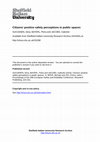
Proceedings of the 29th European Safety and Reliability Conference (ESREL)
Urban environments can be stressful places and as a majority of people now tend to live in cities... more Urban environments can be stressful places and as a majority of people now tend to live in cities, innovative ways to tackle citizens' insecurities and fears are needed. Smart decisions in planning safe urban places should be guided by the question of how citizens' perceived safety in cities can be improved. In this paper, using an exploratory approach of visual and narrative methods, we develop a framework that captures aspects, which lead to safety perceptions as positive experience. It contains three main themes that support safety perceptions in public spaces: place, perceived social presence and perceived information. We argue that safety perceptions are always a combination of multiple dimensions and aspects, and although safety is often divided into physical and mental safety, participants do refer to both of these interchangeably. Overall, our study contributes to the recent discussions about alternative approaches to safety, offers conceptual insights into the nature of safety as a positive experience and uncovers the broad spectrum of safety understandings as defined by citizens.
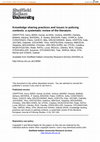
European Journal of Policing Studies
The effective sharing of knowledge both within and between police organizations is arguably becom... more The effective sharing of knowledge both within and between police organizations is arguably becoming increasingly vital for success and has driven research in a disparate range of ields. This paper therefore presents the results of an integrative systematic literature review of research into knowledge sharing within and between police organizations across Europe. The 39 papers analysed were drawn from English-language studies published between 2000 and 2013, complemented by additional searches for non-English language papers in nine European countries. Analyses showed that past research has focused on intra-organizational knowledge sharing, with a particular spotlight on criminal intelligence and technology. Barriers / enablers of knowledge sharing were grouped into knowledge management strategy/legislation, technology, culture and loss of knowledge themes. Research recommendations include exploring the role of leadership and examination of police knowledge sharing across regional, institutional and international boundaries. Practical recommendations include having procedural clarity in systems, policies for sharing knowledge and developing the relevant knowledge, skills and motivation of police personnel through appropriate training.









Uploads
Papers by Gabriele Jacobs